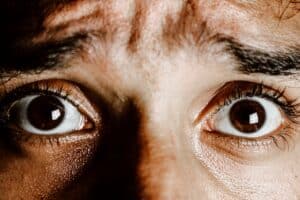Bipolar disorder is a mental health condition that causes extreme mood swings. People with bipolar disorder can experience periods of depression and mania. Or they may alternate between the two. Some suffer from episodes of psychosis during which they lose contact with reality. Such as thinking the FBI is following them or the neighbors are conspiring against them.
Bipolar is a complex disorder and a medically trained professional must diagnose individuals. Some suffer from severe symptoms, (e.g hallucinations, suicidal ideation.) While others deal with similar issues, but with less severe symptoms. If you believe you may have bipolar disorder, be sure to see a medical professional.
Symptoms of Bipolar Disorder

Mania
Mania is a state of heightened mood and energy. Much like a firework. It may be accompanied by increased activity, talkativeness, and racing thoughts. The person may feel euphoric and have an inflated self-esteem. They may also exhibit irritability, anger, and rapid speech (e.g., thought racing). The person may have a decreased need for sleep while they are feeling this way. Mania can occur in Bipolar I disorder (rapid cycling) or Bipolar II disorder (non-rapid cycling).

Hypomania
Hypomania is a milder form of mania. It can be both good and bad. Some people who are hypomanic say they feel great. They might say they are more productive and are getting more things done. However, they may also show signs of poor judgment, irritability, decreased need for sleep, and risky behavior. Either way, hypomania is another symptom of bipolar.
Hypomania doesn’t always mean someone has bipolar disorder. It’s possible to have the condition without experiencing hypomania or mania. Be sure to talk to your doctor about bipolar disorder. They can determine if medication or therapy could help.

Depression
Depression is a mood disorder that can affect how you feel, think and behave. Depression can cause symptoms such as sadness or hopelessness. Losing interest in things you enjoy, having little energy, and always feeling tired.

Psychosis
Bipolar psychosis is a severe symptom of bipolar disorder. It presents with delusions or hallucinations. It’s considered a sign of a more severe episode and should be treated immediately. If not treated quickly it often leads to hospitalization.
The symptoms associated with these psychotic episodes are similar to schizophrenia. But are usually less severe and not as long-lasting.
Types of Bipolar
Bipolar I
This type is considered the most severe due to the mania state. A manic episode if not treated often results in hospitalization.
Bipolar II
Is the less severe type due to the reduced level of mania. Often true mania is not present. Instead numerous states of hypomania. However, the depressive symptoms are often just as severe as type I.
Rapid Cycling Bipolar
Rapid cycling or mixed episode is another type of bipolar disorder. It has symptoms of both mania and depression. This makes it difficult to diagnose.
Mixed episodes are dangerous because they often involve suicidal thoughts or ideation. If you or a loved one is experiencing suicidal thoughts, you must get help as soon as possible. There is a new suicide hotline: dial 988. Read here for more information.
Rates of Bipolar in America
Many people diagnosed with depression may also experience bipolar disorder. An estimated 2.8% of people in America suffered from bipolar last year.
Treatment
If you believe you or a loved one has bipolar be sure to see a medical professional. The most effective treatments for symptoms of bipolar are medication and therapy.
Medications include antipsychotics, antidepressants, and mood stabilizers. Check with your doctor for your options.
Conclusion
Therapy can train the individual on how to navigate the numerous highs and lows that accompany bipolar disorder.
Bipolar disorder is a serious mental illness that can have a devastating impact on your life. It’s important that you know the signs and symptoms so that you can get help if necessary. It is also a lifelong disease and the sooner you get help, the sooner you can feel better.
For more information
Be sure to check out https://www.nimh.nih.gov for numerous great resources on mental health.
Also visit https://www.nami.org.



